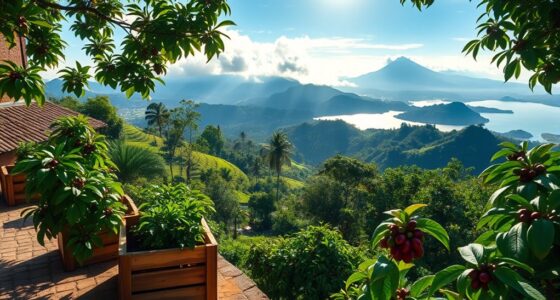When you enjoy Costa Rican coffee, you experience vibrant flavors rooted in ethical and sustainable practices. Farmers use eco-friendly methods like shade-growing and organic farming to protect biodiversity and assure high quality. Fair trade practices guarantee fair wages and support local communities. Sustainable techniques, combined with careful attention and innovation, preserve the environment and produce beans with a bright, balanced profile. To discover how these efforts create an exceptional cup, explore further.
Key Takeaways
- Costa Rican coffee is produced through fair trade practices, ensuring ethical sourcing and fair compensation for farmers.
- Sustainable cultivation methods, including shade-grown and organic farming, protect biodiversity and conserve the environment.
- The use of volcanic soil and modern techniques enhances flavor complexity and maintains high-quality standards.
- Farmer cooperatives promote community support, resource sharing, and ongoing commitment to sustainability.
- Responsible water management and waste reduction practices contribute to environmentally friendly coffee production.

Have you ever tasted coffee that captures the essence of a lush tropical landscape? If so, you’ve experienced the remarkable quality of Costa Rican coffee, renowned worldwide for its vibrant flavors and sustainable roots. Behind each cup, there’s a story of careful cultivation and ethical practices that support local communities and the environment. One of the key factors that contribute to the coffee’s exceptional quality is the country’s commitment to fair trade practices. These practices ensure that farmers receive fair compensation for their work, which in turn motivates them to maintain high standards and invest in sustainable growth. By adhering to fair trade principles, coffee producers focus on social equity, environmental health, and economic stability, making every sip not just delicious but also ethically sound.
Costa Rican coffee embodies fair trade, sustainability, and vibrant flavors rooted in ethical cultivation practices.
Costa Rica’s coffee cultivation methods are equally impressive, emphasizing meticulous attention to detail and environmentally friendly techniques. Farmers often use shade-grown methods, which protect biodiversity and help conserve native flora and fauna. These methods also improve the quality of the beans by allowing them to ripen slowly, developing richer flavors. The country’s volcanic soil provides a naturally fertile foundation, giving the coffee a unique character that’s both smooth and complex. Coffee cultivation here is a blend of tradition and innovation—farmers combine age-old techniques with modern practices to optimize quality while minimizing environmental impact. Organic farming is increasingly common, avoiding synthetic chemicals and prioritizing soil health, which ultimately translates into a cleaner, more vibrant cup of coffee. Additionally, the focus on sustainable farming practices helps protect the environment and ensures the longevity of coffee production in the region.
You’ll notice that Costa Rican coffee farmers often work closely with local cooperatives, fostering a sense of community and shared purpose. This collaboration enables farmers to access better resources, training, and markets, ensuring they can sustain their livelihoods. The focus on sustainable coffee cultivation methods also means that water usage is carefully managed, and waste is minimized through composting and recycling initiatives. These practices not only protect the environment but also produce beans with a bright, well-balanced flavor profile that coffee connoisseurs truly appreciate. Additionally, understanding and managing production quantity variances help farmers optimize their harvests and maintain consistent quality year after year.
When you brew a cup of Costa Rican coffee, you’re tasting the result of a careful, moral process that values quality and sustainability. Every sip reflects the dedication of farmers who prioritize fair trade practices and environmentally conscious cultivation methods. It’s a testament to a country that recognizes the importance of producing coffee responsibly, ensuring that future generations can enjoy this rich tradition. So next time you enjoy a cup, remember that it embodies more than just flavor—it embodies a commitment to fairness, sustainability, and excellence in every bean.
Frequently Asked Questions
How Does Costa Rican Coffee Impact Local Communities Economically?
You see, coffee farming plays a crucial role in boosting local communities economically. It provides jobs and supports rural development, helping farmers and their families thrive. When you buy Costa Rican coffee, you’re directly contributing to this growth, ensuring that the community benefits from sustainable practices. This cycle of economic activity helps maintain local traditions and improves living standards, making coffee an indispensable part of rural Costa Rican life.
What Certifications Ensure Costa Rican Coffee’s Sustainability Standards?
Did you know that about 70% of Costa Rican coffee is certified organic or Fair Trade? These certifications ensure the coffee meets strict sustainability standards. Fair Trade guarantees fair wages and ethical practices, while Organic Certification confirms environmentally friendly farming methods. By choosing certified coffee, you support sustainable agriculture, protect ecosystems, and promote fair treatment for farmers, making your coffee choice impactful for both the environment and local communities.
How Do Climate Changes Threaten Costa Rican Coffee Production?
Climate change threatens Costa Rican coffee production by altering weather patterns, increasing pests, and impacting crop yields. You need to focus on climate adaptation strategies, like diversifying crops and improving pest management, to protect coffee farms. These measures help farmers respond to unpredictable conditions, ensuring coffee quality and sustainability. Staying proactive in managing climate risks is vital for maintaining the country’s renowned coffee standards in a changing environment.
Are There Specific Coffee Varieties Unique to Costa Rica?
Think of Costa Rican coffee as a garden of rare blooms. You’ll find unique coffee varietals here, each with distinctive flavors that set them apart. These specialty beans are carefully cultivated, showcasing the country’s rich agricultural heritage. Costa Rica’s variety of coffee plants offers an exceptional experience for connoisseurs, making each cup a tribute to the nation’s dedication to quality and uniqueness in every bean.
How Is Costa Rican Coffee Supporting Biodiversity Conservation Efforts?
You can see how Costa Rican coffee supports biodiversity by thriving on shade-grown farms that preserve native flora. These farms provide habitats for diverse wildlife, helping conserve local ecosystems. By choosing coffee from these farms, you’re supporting efforts to protect native plants and animals while promoting sustainable practices. This balance guarantees coffee quality and environmental health, making each cup a conscious choice for the planet.
Conclusion
As you savor a cup of Costa Rican coffee, remember it’s like a carefully woven tapestry of sustainability and quality. Every sip transports you to lush, vibrant plantations where passion and tradition blend seamlessly. By choosing this coffee, you’re not just enjoying a rich flavor—you’re supporting a thriving ecosystem that values both the environment and excellence. Your appreciation fuels the cycle, ensuring that this beautiful harmony continues to flourish with each cup you enjoy.









